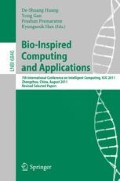Abstract
The disadvantages of apriori algorithm are firstly discussed. Then, a new measure of kendall-τ is proposed and treated as an interest threshold. Furthermore, an improved Apriori algorithm called K-apriori is proposed based on kendall-τ correlation coefficient. It not only can accurately find the relations between different products in transaction databases and reduce the useless rules but also can generate synchronous positive rules, contrary positive rules and negative rules. Experiment has been carried out to verify the effectiveness of the algorithm. The result shows that the algorithm is effective at discovering the association rules in a sales management system.
Access this chapter
Tax calculation will be finalised at checkout
Purchases are for personal use only
Preview
Unable to display preview. Download preview PDF.
References
Srikant, R., Agrawal, R.: Mining Generalized Association Rules. In: Proc. of the 21th Int’l. Conf. on Very Large Data Bases, pp. 407–419. Morgan Kaufmann, Zurich (1995)
Savasere, A., Omiecinski, E., Navathe, S.: Mining for Strong Negative Associations in a Large Database of Customer Transactions. In: Proc. of the 14th Int’l. Conf. on Data Engineering, Orlando, Florida, pp. 494–502 (1998)
Jalalvand, A., Minaei, B., Atabaki, G., Jalalvand, S.: A New Interestingness Measure for Associative Rules Based on the Geometric Context. In: Proc of the Third Int’l Conf. on Convergence and Hybrid Information Technology, Busan, Korea, pp. 199–203 (2008)
Zeng, A.P., Huang, Y.P., Li, G.j.: FP-Growth Algorithm Based Covariance and its Application in ERP. Mathematics in Practice and Theory 38(12), 11–18 (2008)
Li, Y.Q., Zhao, L.W., Wang, Q., Tang, J.Y.: Non-parameter Statistics, pp. 116–119. Southwest Jiaotong University Press (2010)
Agrawal, R., Imielinski, T., Swami, A.: Mining Association Rules Between Eet of Items in Large Databases. In: Proceedings of the 1993 ACM SIGMOD Conference on Management of Data, Washington, D. C, pp. 207–216 (1993)
Shao, F.J., Yu, Z.Q., Wang, J.L., Sun, R.C.: Principle and Algorithm of Data Mining, pp. 92–99. Science Press, Beijing (2009)
Michael, J.A., Gordon, S.L.: Data Mining Technology For Marketing, Sales, and Customer Relationship Managementn. Machinery Industry, 340–350 (2006)
Author information
Authors and Affiliations
Editor information
Editors and Affiliations
Rights and permissions
Copyright information
© 2012 Springer-Verlag Berlin Heidelberg
About this paper
Cite this paper
Zeng, A., Huang, Y. (2012). An Association Rules Algorithm Based on Kendall-τ . In: Huang, DS., Gan, Y., Premaratne, P., Han, K. (eds) Bio-Inspired Computing and Applications. ICIC 2011. Lecture Notes in Computer Science(), vol 6840. Springer, Berlin, Heidelberg. https://doi.org/10.1007/978-3-642-24553-4_22
Download citation
DOI: https://doi.org/10.1007/978-3-642-24553-4_22
Publisher Name: Springer, Berlin, Heidelberg
Print ISBN: 978-3-642-24552-7
Online ISBN: 978-3-642-24553-4
eBook Packages: Computer ScienceComputer Science (R0)

